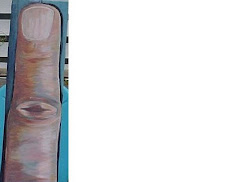"This was no accident. Wall Street, Ben and Tim, and their Congressional co-defendants keep saying this was a horrible, unforeseeable accident. Nonsense, it was the result of conscious, planned looting and will be followed by more." Whew. Glad he said that (the 'he' being Jim Jubak of Jim Jubak's report, which I found on Jim Fitch's "Some Assembly Required"), because when I say such things, people think I'm channeling Hillary when she was talking about a vast right-wing conspiracy (Hillary wasn't so nuts, there was in fact, something Auntie Coulture brags about now, a group of "elves" busily at work to entrap her husband).
Isn't it incomprehensible that a stock market can go up 497 points, three days after another 20 banks go kaput? and everything which can go wrong has gone wrong?
Omni National Bank in Georgia Shut, 21st U.S. Failure...Georgia again...hmmmm. It's become increasingly apparent why Tom Wolfe based his novel, "A Man in Full" in California and Georgia, the outright criminality of Texas being a matter of pride for that erstwhile Republic.
Data indicates that Japan's economy, which in past recessions relied on exports to recover, won't be supported by overseas demand.
The "long term investor" now realizes that he or she is simply a mark to be conned by Wall Street...aahhh, if only that were true. Many firms are cutting their matching contributions to their employees' 401k's...they realize they're just throwing money away.
Oil markets may not be pricing in the extent of dwindling output in the world's biggest producer, Russia, a factor that could buoy prices later this year, traders and analysts said.
This month, the brokerage cut its forecast for Russia's crude production this year to 9.1 million barrels a day, a 7% drop from last year.
While the Russian government, whose coffers rely on oil revenue, has eased the tax burden somewhat in a bid to stabilize output, it is unlikely to do anything more, despite producer pleas, as the federal budget looks set to post its first deficit in 10 years.
In early January, Russia's five biggest producers -- OAO Rosneft, OAO Lukoil Holdings, TNK-BP Ltd., OAO Surgutneftegas and OAO Gazprom Neft -- announced an average annual reduction in capital spending of 15% for 2009.
Moscow-based Alfa Bank reckons the annual rate of decline in production at Russian oil fields already in operation totals 15% to 17%, compared with a rate of 7% in 1998. The higher rate implies producers would need to bring 1.5 million barrels a day in new output on stream just for production to stay flat.
"That's just not going to happen," said Alfa's head of research, Ron Smith.
Russia is responsible for about 20% of non-OPEC oil supply. Last week, the International Energy Agency lowered its forecast for 2009 non-OPEC supply growth to zero, largely due to production problems in the Caspian state of Azerbaijan.
Japanese Automobile exports slid 70.9 percent. Companies from Toyota Motor Corp. to Panasonic Corp. fire thousands of workers.
Property abandonment is getting so bad in Flint that some in government are talking about an extreme measure that was once unthinkable -- shutting down portions of the city, officially abandoning them and cutting off police and fire service.
Last year, the city of Youngstown, Ohio, proposed incentives to encourage people to move out of nearly empty blocks and relocate to more populated areas closer to the heart of the city. Some people were offered upward of $50,000, according to news reports. Our throw-away society has effectively reached a new level of efficiency: the throw-away city, to go with the throw-away people.
The amount by which U.S. pensions are underfunded has almost doubled since October to $373 billion,
The U.S. has blocked expansion of the drawing-rights system over the past 12 years, according to the IMF Web site. SDRs were created by the IMF in 1969 to support the Bretton Woods exchange-rate system that collapsed in 1971. They now act as a unit of account, reflecting contributions from members, rather than a currency.
Krugman: Even during the “go-go years,” the bull market of the 1960s, finance and insurance together accounted for less than 4 percent of G.D.P. Until 1982 the Dow Jones Industrial Average contained not a single financial company. In essence, the administration seems to believe that once investors calm down, securitization — and the business of finance — can resume where it left off a year or two ago. Doing what exactly, now that entrapping hopeful fools into financial traps has proven unsavory?
To be fair, officials are calling for more regulation. Indeed, on Thursday Tim Geithner, the Treasury secretary, laid out plans for enhanced regulation that would have been considered radical not long ago.
But the underlying vision remains that of a financial system more or less the same as it was two years ago, albeit somewhat tamed by new rules.
As you can guess, I don’t share that vision. I don’t think this is just a financial panic; I believe that it represents the failure of a whole model of banking, of an overgrown financial sector that did more harm than good. I don’t think the Obama administration can bring securitization back to life, and I don’t believe it should try.
The West's way of thinking: It would be much simpler for us if the world were set up in a more orderly and predictable way. But then, it wouldn't be nearly as much fun. Even the feds could control a simpleton's world. What a dreary place that would be! If you can't be periodically throwing people out onto the streets so that con-men calling themselves "Masters of the universe" can rake in enormous amounts of cash to keep their high maintenance wives on parade, how would life be worth living?
Sunday, March 29, 2009
Subscribe to:
Post Comments (Atom)



















































No comments:
Post a Comment